Episodes

Wednesday Oct 08, 2025
Elevating the Discourse with Danny Lybarger
Wednesday Oct 08, 2025
Wednesday Oct 08, 2025
Episode 136
In part 27 of our Sinai and Synapses interview series, we are talking with Rev. Danny Lybarger. Danny is the Lead and Founding Pastor of The Well, a vibrant and inclusive United Methodist Church plant in Weldon Spring, MO, known for its commitment to creating safe spaces for all, especially those traditionally marginalized by the church. With a BA from George Fox University and an M.Div from United Theological Seminary, Danny combines theological depth with a passion for bridging the gap between faith and everyday life. Under his leadership, The Well has experienced significant growth and has been viewed as a compelling new model for ministry at the intersection of inclusivity and evangelicalism. Outside of pastoring, Danny enjoys spending time with his family, staying active at CrossFit St. Louis, and coaching his kids’ sports teams.
Sinai and Synapses - https://sinaiandsynapses.org/
Support this podcast on Patreon at https://www.patreon.com/DowntheWormholepodcast
More information at https://www.downthewormhole.com/
produced by Zack Jacksonmusic by Zack Jackson and Barton Willis

Wednesday Sep 03, 2025
Elevating the Discourse with Randy Wedin
Wednesday Sep 03, 2025
Wednesday Sep 03, 2025
Episode 135
In part 26 of our Sinai and Synapses interview series, we are talking with Dr. Randy Wedin. He is a freelance science writer and a Lay Teacher at the Minnesota Zen Meditation Center (MZMC). He earned his PhD in Chemistry at Harvard University and his BA in Chemistry and English Literature at St. Olaf College (Minnesota). As a science writer, he uses his communication skills to bridge the gap between the worlds of science, business, government, and the public. He has research and writing experience on a broad range of science-related topics, from green chemistry, drug development, and sustainability to smart grid, public outreach, and K-12 science education. In addition, he has written creative nonfiction essays and op-ed articles for general audiences on subjects related to parenting, relationships, and daily life, often using metaphors from the world of science to provide new perspectives on these topics. His current focus at MZMC is on exploring the relationship of science and Zen Buddhism in his dharma talks and a six-week course he taught on “Zen and Science”.
Sinai and Synapses - https://sinaiandsynapses.org/
Support this podcast on Patreon at https://www.patreon.com/DowntheWormholepodcast
More information at https://www.downthewormhole.com/
produced by Zack Jacksonmusic by Zack Jackson and Barton Willis
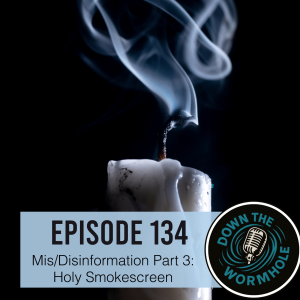
Friday Jul 18, 2025
Mis/Disinformation Part 3: Holy Smokescreen
Friday Jul 18, 2025
Friday Jul 18, 2025
Episode 134
How do our religious communities become breeding grounds for bad science and misinformation? Is religion itself to blame or is there something else at work? Secret foreskin heists, biblical breakfast wisdom, and a cure for ignorance!
Support this podcast on Patreon at https://www.patreon.com/DowntheWormholepodcast
More information at https://www.downthewormhole.com/
produced by Zack Jacksonmusic by Zack Jackson and Barton Willis
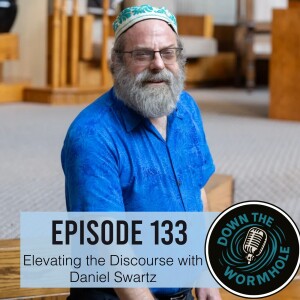
Thursday Jun 19, 2025
Elevating the Discourse with Daniel Swartz
Thursday Jun 19, 2025
Thursday Jun 19, 2025
Episode 133
In part 25 of our Sinai and Synapses interview series, we are talking with Rabbi Daniel Swartz. He is the spiritual leader at Temple Hesed of Scranton and Executive Director of the Coalition on the Environment and Jewish Life (COEJL). Previously, Rabbi Swartz held leadership positions with Greater Washington Interfaith Power and Light, the National Religious Partnership for the Environment, the Children’s Environmental Health Network, and the Religious Action Center of Reform Judaism. He is the lead author and editor of “To Till and To Tend: A Guide for Jewish Environmental Study and Action” as well as “Faith Communities and Environmental Health."
Sinai and Synapses - https://sinaiandsynapses.org/
Support this podcast on Patreon at https://www.patreon.com/DowntheWormholepodcast
More information at https://www.downthewormhole.com/
produced by Zack Jacksonmusic by Zack Jackson and Barton Willis
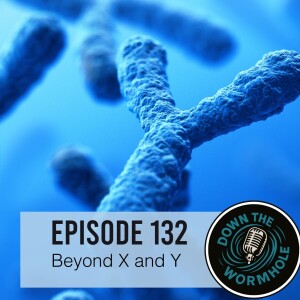
Tuesday Jun 03, 2025
Mis/Disinformation Part 2: Beyond X and Y
Tuesday Jun 03, 2025
Tuesday Jun 03, 2025
Episode 132
The Trump Administration has waged an all out war on gender and sex. They claim to be motivated by "common sense science" and religious truths, but are disingenuous and incomplete on both fronts. We talk about the actual science of biological sex, the Talmud's surprisingly expansive view of gender, why this is such a pressing issue, and how we can stand up for truth and dignity.
Support this podcast on Patreon at https://www.patreon.com/DowntheWormholepodcast
More information at https://www.downthewormhole.com/
produced by Zack Jacksonmusic by Zack Jackson and Barton Willis
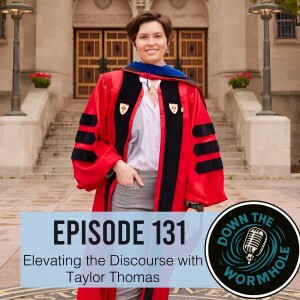
Wednesday May 21, 2025
Elevating the Discourse with Taylor Thomas
Wednesday May 21, 2025
Wednesday May 21, 2025
Episode 131
In part 24 of our Sinai and Synapses interview series, we are talking with Dr Taylor Thomas. She is an interdisciplinary scholar, artist, and educator specializing in philosophy and religion. Currently, she serves as a part-time philosophy instructor and a postdoctoral fellow at the Center for Mind and Culture. Her research focuses on developing interdisciplinary frameworks to address moral agency in today's complex world, aiming to overcome challenges that suppress awareness, freedom, and opportunity. In addition to her academic pursuits, Dr. Thomas engages in creative endeavors, aiming to make existential musings tangible and relatable through multimedia experiences. She is also the host of the "Tillich Today" podcast, which explores the ideas of theologian and philosopher Paul Tillich.
https://taylormariethomas.squarespace.com/
https://podcasts.apple.com/us/podcast/tillich-today/id1725855909
https://www.youtube.com/@BYTE-GEIST
Sinai and Synapses - https://sinaiandsynapses.org/
Support this podcast on Patreon at https://www.patreon.com/DowntheWormholepodcast
More information at https://www.downthewormhole.com/
produced by Zack Jacksonmusic by Zack Jackson and Barton Willis
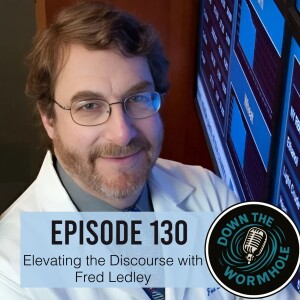
Wednesday May 07, 2025
Elevating the Discourse with Fred Ledley
Wednesday May 07, 2025
Wednesday May 07, 2025
Episode 130
In part 23 of our Sinai and Synapses interview series, we are talking with Dr Fred Ledley. He is a professor of natural & applied science and management at Bentley University in Waltham, MA and director of the center for integration of science and industry. A physician and pediatrician by training, he has performed research in genomics on the faculties of the Baylor College of Medicine, Texas Children’s Hospital, and Howard Hughes Medical Institute and founded several biotechnology companies focused on gene therapy or personalized medicine. A widely published researcher, his current work focuses on advancing the translation of scientific discoveries for public value by developing synergies between science, medicine, business, and public policy. He has previously participated in the national, NIH-funded program in “Genetics, Religion and Ethics”, part of the ELSI program of the Human Genome project, and a Templeton-funded program “New Visions in Science, Nature and Religion” at US Santa Barbara. He has written a novel, Sputnik’s Child, which explores how science and technology became a faith for members of the baby boom generation and the limits of this faith. He plays clarinet in Shpilkes Klezmer Band and has served on the board of the Boston Jewish Music Festival, Jewish Arts Collaborative, and Celebrity Series of Boston. He joined in a Bnai Mitzvah with his wife, Tamara, at age 31, occasionally reads Torah and serves as darshan as a member of Temple Aliyah in Needham MA, and considers music, hiking the forest, and observing solar eclipses to be spiritual experiences.
Check out his book, "Sputnik's Child" here - https://amzn.to/4dgiZAD
Sinai and Synapses - https://sinaiandsynapses.org/
Support this podcast on Patreon at https://www.patreon.com/DowntheWormholepodcast
More information at https://www.downthewormhole.com/
produced by Zack Jacksonmusic by Zack Jackson and Barton Willis
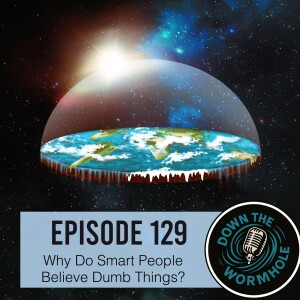
Thursday May 01, 2025
Mis/Disinformation Part 1: Why Do Smart People Believe Dumb Things?
Thursday May 01, 2025
Thursday May 01, 2025
Episode 129
Why do smart people believe dumb things? We unpack cognitive biases, like how judges might deny parole just because they're hungry (or maybe not?). Learn why Steve Jobs wore black turtlenecks, why knowing a little Greek makes pastors dangerous, and why acknowledging your biases doesn't make you immune to them. Plus, we touch on misinformation, trusting experts, and why sometimes, the best advice is to stop learning stuff. It's bias all the way down!
Support this podcast on Patreon at https://www.patreon.com/DowntheWormholepodcast
More information at https://www.downthewormhole.com/
produced by Zack Jacksonmusic by Zack Jackson and Barton Willis




